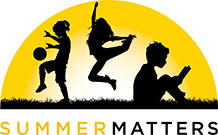CSBA Summer Learning Timeline
A three-stage planning guide for boards developing summer learning programs.
This author has yet to write their bio.Meanwhile lets just say that we are proud Ezra Denney contributed a whooping 57 entries.
A three-stage planning guide for boards developing summer learning programs.
For over 10 years, New Mexico’s K-3 Plus program has been extending the school year for at-risk early elementary school children, with growth of the program fueled by positive findings from pilot studies. Minimum program funding is defined by law, but cost per student varies widely across jurisdictions. The National Summer Learning Association (NSLA) spoke with researcher Linda Goetze at the University of New Mexico to understand the intersection of policy, funding, and return on summer reading investments.
I propose that we retool the old summer school model into summer enrichment camps that focus on 21st century skills. These summer programs would employ teachers who have expertise in applying instructional strategies that foster critical thinking, collaboration, creativity and communication skills in our students. They would work in partnership with nonprofit and other youth-serving organizations, public libraries and others to provide full-day learning and enrichment camps.
This video, produced by The Campaign for Grade Level Reading, highlights the challenges students from under resourced communities face, including due to a lack of summer learning opportunities.
Activity
TA Providers were asked to walk around the room visiting each of the eight sustainability domain posters on the walls and discuss these guiding questions as a group.
What are some best practices for this element?
With no limits, what are other ideas you envision for this element?
Providers wrote ideas on notes for each poster. To read the responses, download the pdf.
How Summer Learning Strengthens Students’ Success is an independent evaluation of three Summer Matters pilot programs. The report measures impact on students’ academic achievement – both during the summer months and extending throughout the school year. Analysis of the data concluded high quality summer learning programs in Fresno, Los Angeles and Sacramento have bolstered students’ academic success by strengthening their academic skills in general and literacy skills in particular, and increasing the effectiveness of their work habits and confidence in their abilities as learners.
Nonprofit organizations serving young people exist to provide meaningful opportunities for those young people to build their skills; experience positive, supportive relationships; and prepare for the future. No one would judge an organization’s worth by its financial soundness alone, but financially unhealthy programs threaten an organization’s ability to achieve its mission. Unfortunately, although they are critical to effective management, core organizational capabilities and effective administrative functions often are mistakenly perceived as peripheral to an organization’s mission.
During this training, adapted from the Summer Matters Technical Assistance Manual, participants will learn about elements of high-quality summer programs and effective tools to guide programs in their ongoing development of quality programming.
By the time a low-income child enters fifth grade, he or she can be up to three grade levels behind other classmates in reading and math. One key contributor to this gap is the absence of learning opportunities during summer months, which results in learning loss.
Notes from 2015 Summer Matters TA Providers Meeting. Ideas on how to help new summer programs were shared.
